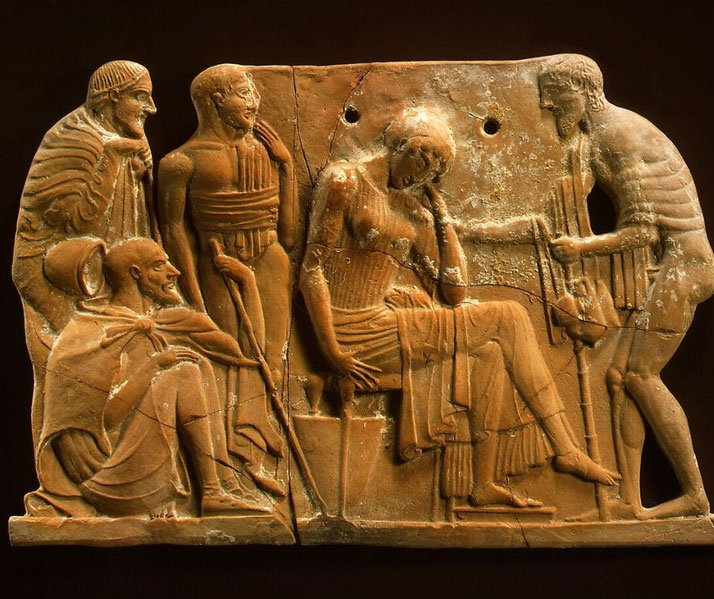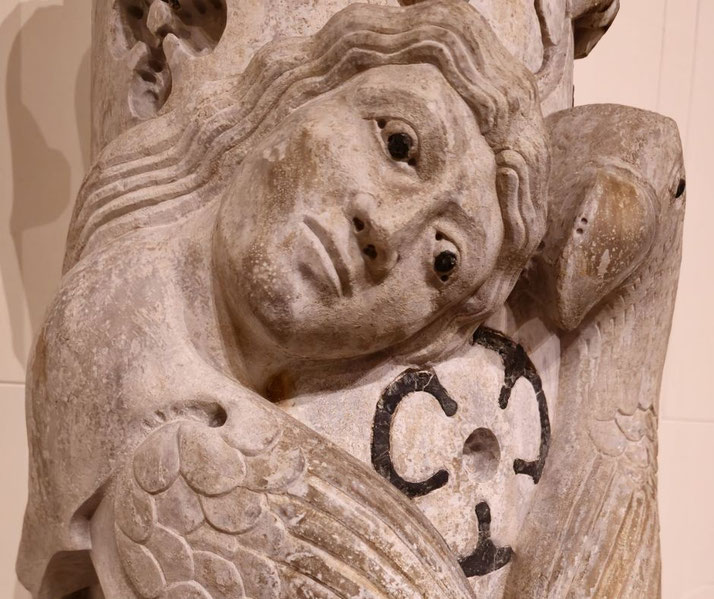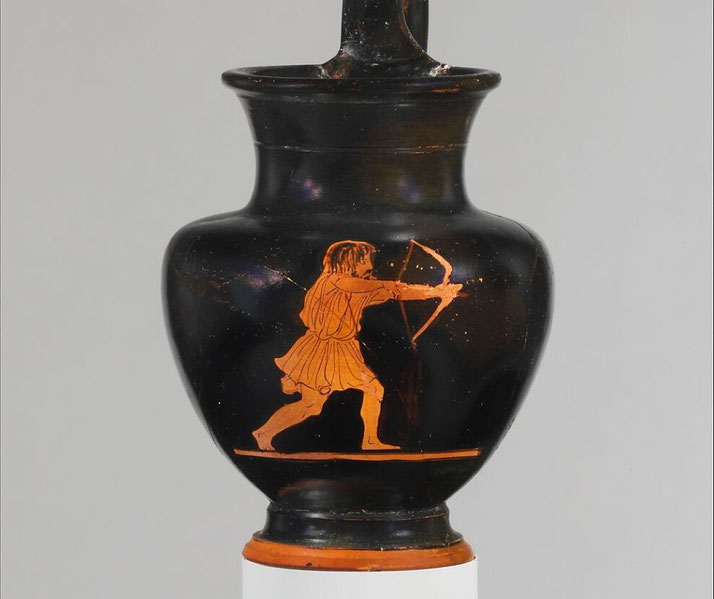The epic adventure of Odysseus: A tale of gods, monsters, and one man's quest for home

One of the most famous characters in ancient mythology is known as Odysseus. He was a legendary Greek hero of the Trojan War and the central character of Homer's "Odyssey."
Known for his cunning intelligence, indomitable will, and complex moral character, Odysseus embodies the quintessential qualities of a hero in ancient Greek culture.
He was a man caught between the world of gods and mortals, navigating challenges that tested not just his physical prowess but also his intellectual and ethical mettle.
The world of Odysseus
The story of Odysseus is traditionally dated to the 8th century BCE, a period when the Greek city-states were emerging as centers of power and influence.
However, the narrative itself is set in a much earlier time, often considered to be around the 12th or 13th century BCE, a murky period in history that straddles the line between myth and reality.
This was the era of the Mycenaean civilization, the first advanced Greek society, and the supposed time of the Trojan War, the monumental conflict that serves as the backdrop for both the "Iliad" and the "Odyssey."
The Trojan War, whether historical or mythical, represents a significant cultural memory for the ancient Greeks.
It was a war that pitted the Achaeans, a coalition of Greek states, against the city of Troy in Asia Minor.
The war and its heroes were subjects of numerous poems, plays, and artworks, serving as a wellspring of themes and motifs that would be revisited throughout Greek—and later Roman—literature and philosophy.
Odysseus, originally a somewhat peripheral figure in the "Iliad," takes center stage in the "Odyssey," embodying the Greek virtues of cunning (mētis), courage, and resourcefulness.

Who wrote the Iliad and the Odyssey?
The "Odyssey" itself was likely composed during a time of great transition and consolidation of cultural ideas.
The 8th century BCE was a period of social and political change, marked by the rise of the polis, or city-state, as the primary unit of Greek life.
It was also a time when oral traditions were increasingly being committed to writing, thanks in part to the adoption of the Phoenician alphabet, adapted to suit the Greek language.
The epic poems of Homer, whether penned by a single individual or a collective, played a crucial role in shaping these emerging identities, offering a shared history, a set of values, and a cultural touchstone that would endure for centuries to come.
Thus, the story of Odysseus is not just a tale of adventure; it is a cornerstone of a civilization, reflecting the fears, aspirations, and ideals of a people on the cusp of history.
What was Odysseus' role in the Trojan War?
In the "Iliad," Odysseus is not the central figure—that honor goes to Achilles—but he plays a crucial role as a wise counselor, skilled orator, and cunning strategist.
His intelligence and diplomatic skills are evident in several key episodes, including his attempts to prevent Achilles from abandoning the Achaean cause and his role in negotiating complex situations among the Greek leaders.
However, it is in the stratagem of the Wooden Horse that Odysseus' cunning reaches its pinnacle.
Frustrated by a decade-long siege that yielded no victory, the Greeks, under Odysseus' guidance, construct a massive wooden horse, hollowed out to hold a small contingent of their best warriors.
They leave the horse at the gates of Troy as a supposed offering to the gods to ensure a safe journey home, while the rest of the Greek army pretends to sail away.
The Trojans, believing their enemies have finally departed, bring the horse into the city as a token of victory.
This fatal mistake leads to their downfall; the Greek warriors hidden inside the horse emerge under the cover of night, opening the gates for the returned Achaean army and thus sealing the fate of Troy.
Odysseus' incredible journey home to Greece
The "Odyssey," attributed to the ancient Greek poet Homer, picks up where the "Iliad" leaves off, focusing on Odysseus' arduous journey back to his homeland of Ithaca after the fall of Troy.
While the "Iliad" is a tale of war, glory, and tragic heroism, the "Odyssey" is a story of survival, cunning, and the yearning for home.
It is a narrative filled with fantastical elements—gods, monsters, and magical realms—that serve as metaphors for the internal and external challenges that we all face in our lives.
Odysseus' journey is fraught with obstacles, many of which are placed in his path by Poseidon, the god of the sea, who bears a grudge against him for blinding his son, the Cyclops Polyphemus.
Yet, even as the gods intervene in his life, Odysseus shows remarkable resilience and ingenuity.
Whether outwitting the witch Circe, escaping the deadly allure of the Sirens, or navigating the perilous straits between Scylla and Charybdis, Odysseus' trials are as much tests of his wit and wisdom as they are of his physical strength.
His journey becomes a quest for identity, a search for the essence of his being, as he dons various disguises and assumes multiple roles in his interactions with gods, monsters, and men.

Arrival back in Ithaca
The culmination of Odysseus' decade-long journey is his return to Ithaca, a moment fraught with as much tension and complexity as any of his previous adventures.
Far from being a straightforward homecoming, his arrival in Ithaca presents a new set of challenges that test his cunning, patience, and moral judgment.
Odysseus finds his home overrun by suitors vying for the hand of his wife, Penelope, and the throne of Ithaca.
These men, who have been feasting at his expense and plotting to kill his son, Telemachus, represent the antithesis of the values and virtues that Odysseus embodies.
Guided by Athena, who has been his divine ally throughout his journey, Odysseus adopts the disguise of a beggar to assess the situation and plan his next moves.
This disguise serves multiple purposes: it allows him to gauge the loyalty of his servants, the integrity of his wife, and the character of his son, who has grown into manhood in his absence.
The beggar's rags and the stooped posture also symbolize the humility and wisdom gained through his long and arduous journey.
He is no longer just a warrior-hero; he is a mature leader who understands the nuances of human behavior and the complexities of justice.

How Odysseus' identity is revealed
The climax of the epic comes with the contest of the bow, a brilliant scheme devised by Penelope to identify her true husband among the throng of suitors.
The bow, which only Odysseus can string and shoot, serves as a symbol of rightful kingship and conjugal fidelity.
When Odysseus, still in disguise, accomplishes this feat, he reveals his true identity and, with the help of Telemachus and a few loyal servants, slaughters the suitors, thereby restoring his home to its rightful state.
However, the "Odyssey" does not end with mere vengeance; it concludes with reconciliation and renewal.
Odysseus' reunion with Penelope is a poignant moment that reaffirms the values of love, trust, and mutual respect.
Moreover, he seeks to mend the social fabric of Ithaca, damaged by the actions of the suitors, through rites of reconciliation.
His final act is to make peace with Poseidon, the god who had been his nemesis throughout his journey, thereby completing his transformation from a restless adventurer to a wise and just ruler.

What do you need help with?
Download ready-to-use digital learning resources
Copyright © History Skills 2014-2025.
Contact via email
With the exception of links to external sites, some historical sources and extracts from specific publications, all content on this website is copyrighted by History Skills. This content may not be copied, republished or redistributed without written permission from the website creator. Please use the Contact page to obtain relevant permission.





